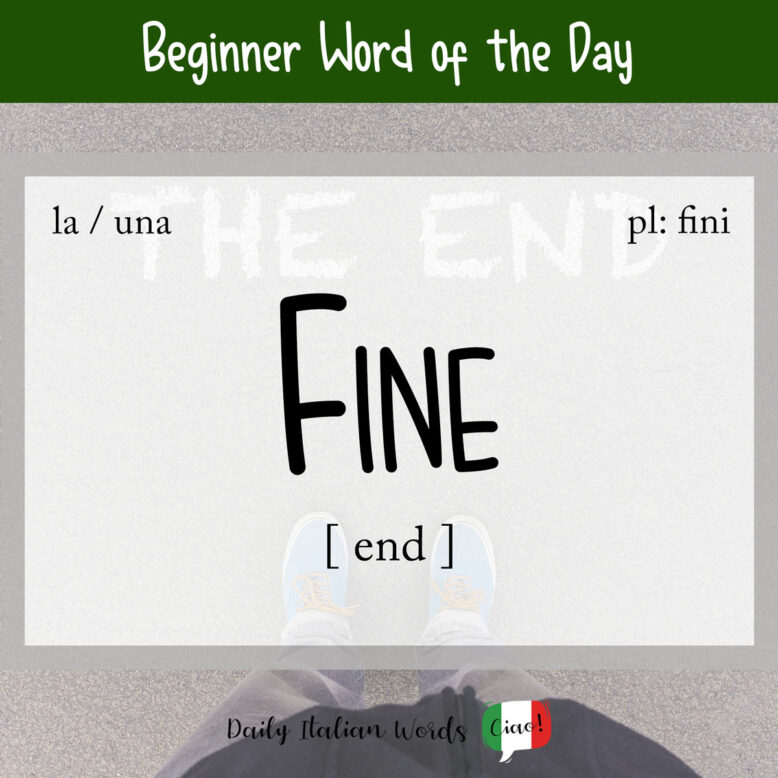What better way to bid farewell to what has been a rather trying 2020 than by talking about the word for end in Italian, which is fine (feminine, plural: fini). Both this word and the English word finish can be traced back to the Latin finis of the same meaning.

As in English, fine can refer to the furthest, most extreme part of something physical such as la fine della strada (the end of the road), in addition to the final part of something such as a period of time, thing or activity:
- la fine della settimana = the end of the week (period of time)
- la fine del libro = the end of the book (thing)
- la fine del gioco = the end of the game (activity)
Note: If you want to talk about the ending of a film or book, you can use the word finale.
Finalmente è arrivata la fine dell’anno. Non vedo l’ora di dimenticare questo 2020!
Finally the end of the year has arrived. I can’t wait to forget 2020!

In Italian and English, fine and end are also euphemisms for a person’s death.
L’anziano signore sentiva l’avvicinarsi della fine.
The old man felt the end approaching.
It appears in numerous idiomatic phrases including:
- alla fine = in the end
- alla fin fine = after all
- in fin dei conti = at the end of the day
- fin di vita = end of one’s life
- brutta fine = bad ending / tragic end
- mettere / porre fine a = to put an end to
- senza fine = without end, endless
Looking at these examples, you might have noticed that fine is sometimes abbreviated to fin but don’t worry – this only ever happens in specific idiomatic expressions.

If you haven’t seen or heard from someone for a while and you find yourself wondering what has happened to them, you might use the expression Che fine ha fatto? (What happened to him / her?). It literally translates as What end did he/she make?
Sai che fine ha fatto Clara? Non la sento da anni!
Do you know what happened to Clara? I haven’t heard from her in years!
Whereas in English we say The End at the end of a book or film, Italians simply say Fine without the definite article.
Important:
When used as masculine noun, fine means purpose / objective or result / outcome. An example of the former is the expression un secondo fine (a hidden objective) whereas the latter is often seen in the idiom andare a buon fine (to bring something to a successful conclusion).
What’s more, fine can also be an adjective meaning fine, thin, acute, refined or subtle depending on the context.
Idiomatic expressions using ‘fine’
È la fine!
Literal translation: It’s the end!
English meaning: It’s game over! / There’s nothing we can do!
Alla fine della fiera...
Literal translation: At the end of the fair…
English meaning: At the end of the day…
Al peggio non c’è mai fine.
Literal translation: There is never an end to the worst.
English meaning: When it rains, it pours.
Fare la fine del topo
Literal translation: To die like a rat
English meaning: To die like a dog
Essere la fine del mondo
Literal translation: To be the end of the world
English meaning: To be disastrous
Alternative English meaning: To be out of this world, to be amazing
Fino alla fine dei secoli
Literal translation: Until the end of the centuries
English meaning: For all time, forever
Heather Broster is a graduate with honours in linguistics from the University of Western Ontario. She is an aspiring polyglot, proficient in English and Italian, as well as Japanese, Welsh, and French to varying degrees of fluency. Originally from Toronto, Heather has resided in various countries, notably Italy for a period of six years. Her primary focus lies in the fields of language acquisition, education, and bilingual instruction.


